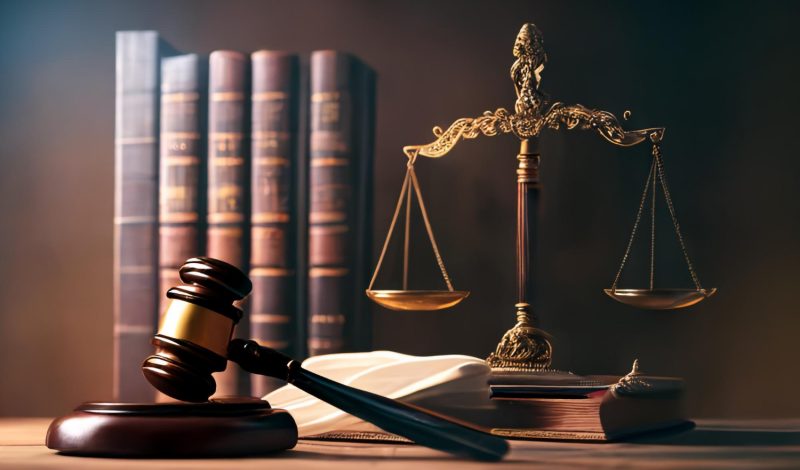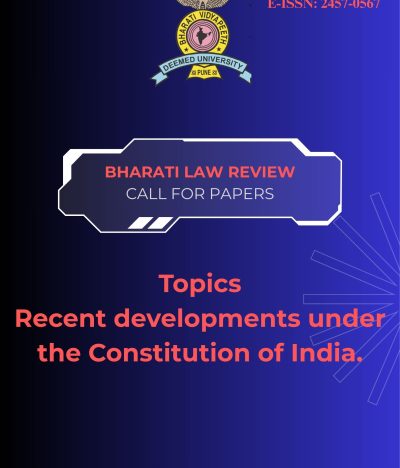Jay Kumar Bhongale
Research Scholar, Lovely Professional University, Punjab, India
Dr Showkat Ahmad Wani
Assistant professor, School of Law, Lovely Professional University, Punjab, India
Abstract:
Indian Constitutional law is silent about the post retirements assignments of the higher court judges. Appointments of judges and judicial accountability has close connection between these two variables, if appointments have been carried out not on the basis of merit or caliber but it was carried out on the basis of political connection then definitely there would be violation of rule of law and mannerisms of judicial accountability. In India, it is a regular phenomenon that retired judges of the Supreme Court and High Court are appointed to some assignments by the government. So, this is a major issue in the Indian judicial system that postretirement assignments carried out with political intention and benefits which also affect delivery of administration of justice, judges give favorable judgements in favour of the political parties on account of future lucrative assignments. In present article, researchers will discuss this issue in detail based on non- empirical data. Non-empirical data will include law commission reports, the Supreme Court judgements, constitutional principles, general principles of judicial conduct and international standards for judges. Judicial accountability is getting injured because of the post-retirement assignments of the Superior court judges. Researchers will try to prove this hypothesis in this article.
Keywords: Judicial Accountability, post-retirement assignments, Colleguim, miscarriage of justice, civil liberties.
1. Introduction:
Judicial accountability is being injured due to the post-retirement assignments of the Superior court judges. This premise is toughly applicable to the present Indian Judicial system. This fact is undeletable even though the Indian Judiciary is the strongest judiciary in the world. Indian Judiciary is the champion of the fundamental rights of the Individuals. The retiring judges of the Supreme Court and High Courts pronounced the judgements which will be pleased the government to gain the post-retirement appointment like various tribunals and commissions.
“The behavior of judges is closely scrutinized to ensure continued confidence in the integrity of the courts”.[1] The public confidence will evaporate if judges seem to be biased when it happens then very institution of Judiciary will lost its worth and the whole judicial function difficult to exercise.[2] Therefore, action that is connected with self-interest and preconception, judges shall
be deserted from it. It was mentioned by author that, “Throughout the ages, and in all societies, impartiality has been regarded as the essence of the administration of justice. It is essential for a judge to maintain, in court, a demeanor which gives to the parties an assurance that their case will be heard and determined on its merits, and not according to some personal predisposition on the part of the judge”.[3]
Judges and normal citizens are similar according to physical appearance but mentally and emotionally they have to be differing from them. It is expressed by author that, “The Judges, also human beings, do not approach the task of adjudication blindfolded. They disembark at the bench already fashioned by their own experiences and by the perception of the society they come from, and they might have belief and disbelief, like everyone else. The difference may happen between judicial fairness and the human being nature of judges. Judges shall not deny their human nature relatively; they have to acknowledge it”.[4] But when they accept their human nature “they shall be in position to recognize how they can reach impartiality which is demand of their job”.[5]
“The Constitution vests a lot of power and a certain amount of immunity in judges. Fairness and impartiality are the fundamental qualities to be possessed by a judge. In India, for the vast majority of cases, there are no reports of having been heard by a partial and unfair judge but there are instances where the contrary happens”.[6]
It was held in Ram Jawayav. State of Punjab[7] that in India, and Indian Constitution has not completely accepted the theory of separation of power in rigid sense even though role of branches of the government has adequately separated from each other because Indian constitution believes that, “One organ of the government shall not interfere and function of other branch of the government”.[8]
Independence of judges does not mean independence from obligations. Recusal is that kind of issue where judges’ capabilities are tested based on temperament. It is a tenet that no one should be judges in his or her own case. Courts must uphold their promises of providing fair and impartial justice by resolving controversies without bias. The practice of recusal, when and how an individual judge should be barred from adjudicating in a specific case in which he has an interest. The opinions of the various scholars in India is that, “Several laws were passed by the parliament and state legislature, through this legislation various tribunals, commissions and other bodies were constituted where the persons who have been the judges of high Courts and Supreme Court of India were appointed. There are also non-statutory commissions like ‘Law commission of India’ where retired judges of high court and Supreme Court may be appointed”.[9]The authors stated that, “The question arises here is that whether Central Government or State Government is bound to consult with Chief justice of SC and respective HC where the retired judges of that court going to appoint to a commission, tribunal or other similar body”?[10] Actually this question will arrive only where the concerned statute is silent relating to appointment or does not provide a specific mode of appointment.
The first ‘Law Commission of India’, headed by M. C. Setalvad, had briefly dealt with this issue. In paragraph 28 of the report, the Commission states: “we have noticed the only bar imposed on a Judge of the Supreme Court who has retired is that he shall not thereafter plead or act in any Court
or before any authority. In the result, some Supreme Court Judges have, after retirement, set up chamber practice while some others have found employment in important positions under the Government. We have grave doubts whether starting chamber practice after retirement is consistent with the dignity of these retired judges and consonant with the high traditions which retired judges observe in other countries.”[11]
“Where is appointment a retired High Court judge to a tribunal or commission lies within the discretion of the Central government or state government and if the consultation with Chief justice of the Supreme Court or the High Court is not approved then there is chances that government will make bias and favourable decision in related to appointment of judges which would indirectly affect the independence and integrity of judicial system. There may be chances come across where appointment have been made on selfishness other than merit and concentrate on political consideration”.[12]To dilute the scope for any such inappropriate considerations there should be appropriate law where retired judged will be appointed to a commission or tribunal only with the consultation of Chief justice of concerned court. It means that Consultation with the Chief Justice of the Supreme Court and High Court would be mandatory.
2. Development in Indian Judiciary
The Supreme Court in State of A.P. v. K. Mohanlal[13], issue of this case was that “appointment of judicial and revenue members to the Special Court constituted under section 7 of the A.P. Land- grabbing (Prohibition) Act, 1982”. In this case, “The state legislation provided that the chairman of the Special Court shall be appointed after consultation with the High Court Chief Justice and in case of the nomination by the respective HC for appointment then consensus with the chief Justice of SC if necessary (in case of the sitting judge of the High Court). In this case no consultation process was applied in appointment judicial members and revenue members”.[14]
“A contention was raised before the Supreme Court that appointment of members of the tribunal without consulting the chief justice of the High Court concerned, Act shall be declared unconstitutional.”[15]The Supreme Court rejected the contention raised and upheld the validity of the Act. This decision is related to the ‘consultation’ process but it was related to validity of the state legislation. “The decision, it must be remembered, was concerned only with the constitutional validity of enactment and not with the desirability of such consultation”.[16] Therefore, in the provision of appointment of retired judges in commission or tribunal as a judge then consultation with Chief justice of Supreme Court and High Court has to be mandatory.
Anangav Udaya Singh Deo v. Ranganath Misra[17], In this case, “the issue before the High Court was whether the respondent, a former Chief Justice of India, could become a Member of Parliament of RajyaSabha in light of the restriction in Article 124(7) of the Constitution. Repelling the contention that Parliament was an ‘authority’ and becoming a Member of Parliament would constitute ‘acting’ for purposes of the said article, the Court held that in interpreting Article 124(7), attention must be paid to Article 220, the analogous provision for High Court judges, specifically to its marginal note which read: “Restriction on practice after being a permanent judge.” Accordingly, the restriction in Article 124(7) should be limited to post-retirement practice. Since acting as a legislator did not constitute such practice, the bar would not apply”.[18]
3. Recent issue
“Justice Gogoi has nominated to RajyaSabha and the appointment of Justice Sathasivam as a Governor”. In these cases a lot of public criticism aroused against the judicial system and judicial independence, many of the legal scholars opined that this appointment is based on pure political desire and favoritism. The citizens are losing faith and the independence of judiciary which is a serious threat for democracy and justice delivery system, even Dr. B. R. Ambedkar has cautioned that once judiciary be corrupted, it will evil day for democracy.
4. Judicial Recusal
A judge may sometimes meet in a situation where differences of interest arise or apparent conflict of interest requires him to recuse from the case. On the ground of bias, the recusal of judges is required. While on the ground of bias, a judge may have to evaluate not only on the basis of real likelihood of bias but also on the ground of reasonable suspicion of bias.
· Recusal of Judges In India
It is the practice in the Supreme Court of India and HC’S judges may not sit on the issue which is connected with his respective state and accumulate the dispute is a very serious. In India there, is absence of any legislation on recusal; several commissions and conferences have discussed the issue and laid down some of the principles.
In India, there is no statute laying down the minimum procedure which judges must follow in order to ensure impartiality.
5. Recent Cases
- Central Bureau of Investigation case[19]:
In this case of Mr. Nageshwara Rao was appointed as chief of the CBI instead of the AlokVerma was removed by the government of India.
This appointment of Mr. Nageshwara Rao was challenged before SC of India where judges were recused themselves to hear the matter, the names of the judges were Chief Justice RanjanGagoi, Justice Ramana and Justice A.k. Sikri. “Rao was continued to be a director after former CBI director AlokVerma was removed by the high-power selection panel headed by PM Modi”.[20]
It has been reported by one of the newspaper that, “The plea by non-government organization (NGO) Common Cause sought the quashing of the order of 10 January and argued that Rao’s appointment as interim director was not according to the constitutional principles and principles in high power appointment usually done in selection considered to be illegal, arbitrary, mala fide and in infringement of the provisions of the Delhi Special Police Establishment Act (DSPE Act)”.[21]
“Appointment of Mr. Rao as a CBI director was considered unauthenticated and legal. It seems that committee has been neglected by the Centre which was acting without jurisdiction appointed Rao,”[22] the plea was added.
- Ayodhyacase[23]:
In this case, lawyer for the Sunni Central Waqf Board, senior advocate Rajeev Dhavan pointed out that Justice UdayLalit had appeared as counsel in the Kalyan Singh case related to the Babri Masjid-Ram Janmabhoomi structure demolition. Kalyan Sing was the Chief Minister at that time when BabriMazid was robbed by the people. Senior advocate Harish Salve spoke up for the judge, saying that it was a different case. The Kalyan Singh case appeared in 1997. It was the judge’s discretion to recuse the case.
Bhima Koregaon case[24]:
Justice B.R. Gavai voluntarily left the case which was related Bhima Koregaon riots. The petition was filed by Navlakha for bail application against the decision of “Bombay High Court refused to quash the FIR registered against him by Pune police” under the provisions of the “Unlawful Activities Prevention Act and the Indian Penal Code. Appeal filed by the Navlakha came before a bench consist of justices NV Ramana, R Subhash Reddy and BR Gavai”.[25]
In this case also, CJI Gogoi also refused to hear the petition and not cited any reason for the recusal. “Bombay High Court Judges including Justice Ranjit More and Dongre refused to cancel the FIR filed against Navlakha because there is prima facie material available against him which contain documents where Novlakha in work against the violence during BhimaKoregaon appeared in 2018”.[26]
Table 1: Recusal Cases in 2021-22
| Case | Judges | Date |
| River Krishna Water Dispute case | Justice Chandrachud and Justice A. S. Boppanna | 3 January 2022 |
| Post poll violence case against Mamata Banerjee | Justice Anirudhha Bose &Justice Indira Banerjee | June 2021 |
The principle of judicial independence is intended to safeguard the justice system and the rule of law. To maintain public trust and confidence in the court, it is imperative that in the present legal system, some critical components of our judicial mechanism need to be revised.
Unless there are reasonable grounds for recusal, a constitutionally appointed judge is obliged to sit on any case assigned to them. The judges should recuse themselves if there is an apprehension that they might bring an impartial mind to the settlement of the question which judges have to decide. Instead of probability, the principle for recusal is a real and not remote possibility.
The analysis is divided into two stages. The judge should always consider first what reasonably leads to apprehension by a fully informed observer that the judge might decide the case other than on its merit; and secondly, whether there is a logical and sufficient connection between those circumstances and that apprehension.
In India there is no guidelines on what basis judges shall recuse themselves from the case. So, it hurt the judicial process and the right of the litigants.
Conclusion:
- Ideally, the retired judges should reject such sinecures in the collective interest of the institution that they have served for many years. It is also a trend that people do not hesitate to link pre-retirement judgments of judges to their post-retirement conduct to secure lucrative appointments. This is an extremely dangerous perception for the institution of the judiciary. It badly tarnishes the image of the judicial system. The time has come when all the stakeholders of the legal profession should sit together to find out a long-lasting solution of this problem.
- Judges shall not accept any posts after retirements if the rule of law or independence of the judiciary will be on stake.
- Age of the Retirements of the SC and HC judges shall be increased so, then issues of post- retirements benefits to judges will not arrive.
- For inevitable appointments of post retirement recruitment a high level committee or commission of SC and HC judges has to be created.
- Article 124 and 217 shall be amended if post retirement jobs of the SC and HC judges want to be continued, in this way it may be controlled by proper law.
- Judges will perform their duties and exercise powers as judge honourably, faithfully, impartially and conscientiously.
- Edible equilibrium between judge’s self-autonomy and judicial accountability.
- A judge has a constitutional duty when despairing justice and rendering judgements fairly while presiding once a case. When judges are assigned to a case, they should review the facts of the case impartially and determine whether they have any conflict of interest that would possibly prevent them from being impartial, ethical and fair.
- There is no statute in India that specifies the minimum procedure that judges must follow to ensure impartiality. However, courts have always insisted that judges and other adjudicatory authorities must adhere to impartiality principles. The principles of natural justice have evolved alongside the progress of civilization.
- A law for recusal shall be passed by the Parliament of India.
- Judges shall provide the reason of the recusal in every case.
References
[1] Chief Justice R. C. Lahoti, “First M. C. Setalvad Memorial Lecture on “Canons of Judicial Ethics “” 81 (presented at the Canons of Judicial Ethics , 45 University of New Brunswick L. Jour., 1991), XLV.; This quote laid down by Lord Hewart the Lord Chief Justice of England in the year 1924.
[2]KharelRajendra, “Recusal and Disqualification of Judges: An Overview”4 NJA Law Journal 13- 24 (2010).
[3]Id.
[4]KharelRajendra, “Recusal and Disqualification of Judges: An Overview”4 NJA Law Journal 13- 24 (2010).
[5]Id.
[6]ManeeshChhibber, “Recusal has become a selective call of morality for Supreme Court judges,” 2019 available at: https://theprint.in/opinion/recusal-supreme-court-judges-gautam-navlakha- kashmir-cji-gogoi/303036/.
[7]Ram Jawayav. State of Punjab AIR 1955 SC 549.
[8]Id.
[9]PriyadarshiniBarua, SarthakMakkar and VasanthiHariharan, “Judicial Recusal: A Comparative Analysis Editorial” 7 GNLU Law Review 1–16 (2020).
[10]KharelRajendra, “Recusal and Disqualification of Judges: An Overview”4 NJA Law Journal
13-24 (2010).
[11]Lokendra Malik, “Chapter 5 Post-Retirement Assignments of the Supreme Court Judges in India: A Critical Analysis” SSRN Electronic Journal 39 (2020).
[12]Id.
[13]State of A.P. v. K. Mohanlal (1998) 5 SCC 468.
- Id.
- Id.
- Id.
[17] AIR 2000 Ori 24.
[18]Lokendra Malik, “Chapter 5 Post-Retirement Assignments of the Supreme Court Judges in India: A Critical Analysis” SSRN Electronic Journal 39 (2020).
[19]“Supreme Court holds CBI’s ex-interim chief Nageswara Rao guilty of contempt”, The Hindu, 12-2- 2019, available at
https://www.livemint.com/politics/news/another-judge-recuses-himself-from-hearing-plea- against-cbi-s-rao-1548914117000.html; (last visited September 10, 2020).
- Id.
- Id.
- Id.
[23]M Siddiq (D) ThrLrs v. Mahant Suresh Das &Ors.(decided by SC in November 9, 1919).
[24]Bhima Koregaon case: Another Supreme Court Judge recuses himself from hearing GautamNavlakha’s plea, The Leaflet, 1/10/2019, available at https://www.theleaflet.in/bhima-koregaon-case-another- supreme-court-judge-recuses-himself-from-hearing-gautam-navlakhas-plea/#; (last visited on 10 September 2020).
- Id.
- Id.





